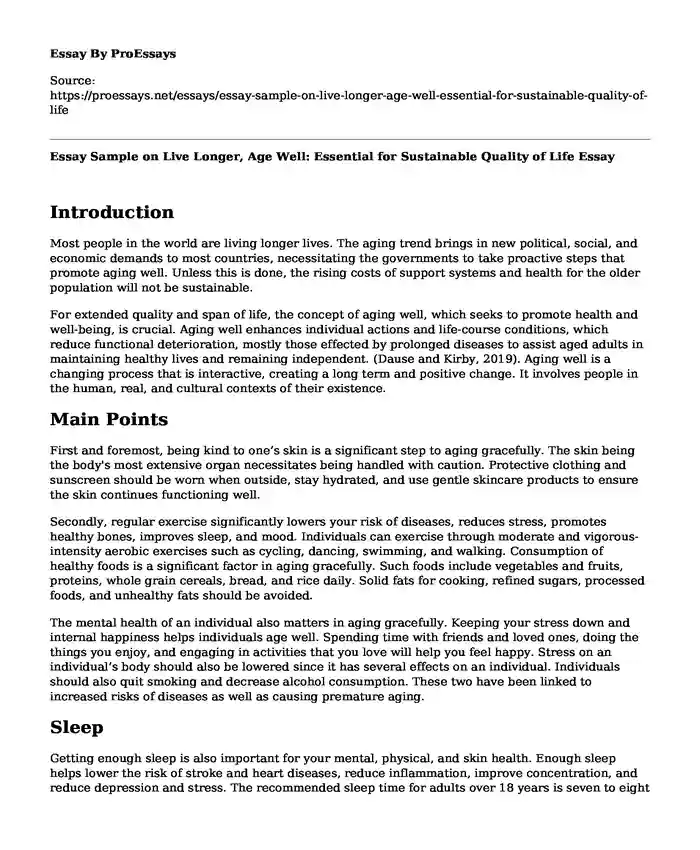Introduction
Most people in the world are living longer lives. The aging trend brings in new political, social, and economic demands to most countries, necessitating the governments to take proactive steps that promote aging well. Unless this is done, the rising costs of support systems and health for the older population will not be sustainable.
For extended quality and span of life, the concept of aging well, which seeks to promote health and well-being, is crucial. Aging well enhances individual actions and life-course conditions, which reduce functional deterioration, mostly those effected by prolonged diseases to assist aged adults in maintaining healthy lives and remaining independent. (Dause and Kirby, 2019). Aging well is a changing process that is interactive, creating a long term and positive change. It involves people in the human, real, and cultural contexts of their existence.
Main Points
First and foremost, being kind to one’s skin is a significant step to aging gracefully. The skin being the body's most extensive organ necessitates being handled with caution. Protective clothing and sunscreen should be worn when outside, stay hydrated, and use gentle skincare products to ensure the skin continues functioning well.
Secondly, regular exercise significantly lowers your risk of diseases, reduces stress, promotes healthy bones, improves sleep, and mood. Individuals can exercise through moderate and vigorous-intensity aerobic exercises such as cycling, dancing, swimming, and walking. Consumption of healthy foods is a significant factor in aging gracefully. Such foods include vegetables and fruits, proteins, whole grain cereals, bread, and rice daily. Solid fats for cooking, refined sugars, processed foods, and unhealthy fats should be avoided.
The mental health of an individual also matters in aging gracefully. Keeping your stress down and internal happiness helps individuals age well. Spending time with friends and loved ones, doing the things you enjoy, and engaging in activities that you love will help you feel happy. Stress on an individual’s body should also be lowered since it has several effects on an individual. Individuals should also quit smoking and decrease alcohol consumption. These two have been linked to increased risks of diseases as well as causing premature aging.
Sleep
Getting enough sleep is also important for your mental, physical, and skin health. Enough sleep helps lower the risk of stroke and heart diseases, reduce inflammation, improve concentration, and reduce depression and stress. The recommended sleep time for adults over 18 years is seven to eight hours. Drinking enough water daily also helps to keep the skin healthy and reduce the signs of aging. Finally, regular visits to the doctor are very important. This is because doctors can find problems early enough.
According to a study carried out by Fry and colleagues', there are numerous examples of determinants that contribute to aging well in diverse societies. For instance, in Hong Kong, a happy adult age is characterized by class and human characteristics that prove tolerance and being open-minded. Also, in the US, activity, and engagement are linked to aging well. Just as Fry and colleagues recommend, sufficient pensions and good health are important. Among the societies considered, determinants that are essential to age well. Such include material security, meaningful daily activity, and social resources are obvious, though their relativistic enrichments may differ.
Conclusion
Many pieces of research promote the aging well concept. Contemporary worldwide study efforts are progressing from distinguishing the determinants of aging well to examining a blended basis and studying workable environmental and guides. Certain study ambitions will aid in identifying environments, populations, public policies, services, and programs that support older adults' continued involvement in positive, productive, and healthy living.
References
Dause, T. J., & Kirby, E. D. (2019). Aging gracefully: social engagement joins exercise and enrichment as a key lifestyle factor in resistance to age-related cognitive decline. Neural regeneration research, 14(1), 39.
Lok, N., Lok, S., & Canbaz, M. (2017). The effect of physical activity on depressive symptoms and quality of life among elderly nursing home residents: Randomized controlled trial. Archives of gerontology and geriatrics, 70, 92-98.
Cite this page
Essay Sample on Live Longer, Age Well: Essential for Sustainable Quality of Life. (2023, Sep 25). Retrieved from https://proessays.net/essays/essay-sample-on-live-longer-age-well-essential-for-sustainable-quality-of-life
If you are the original author of this essay and no longer wish to have it published on the ProEssays website, please click below to request its removal:
- Blood Pressure Analysis - Report Sample
- Essay Sample on Matrix Care Application
- Essay Sample on Effects of Physical Exercise on Brain's Response to Stress
- What is Trust? - Essay Sample
- Discrimination and Prejudice Against the Mentally Ill People - Research Paper
- Research Paper on Schizophrenia and Bipolar Mania
- Train Mental Health Professionals for Treating PTSD: APA's Clinical Practice Guideline - Essay Sample







